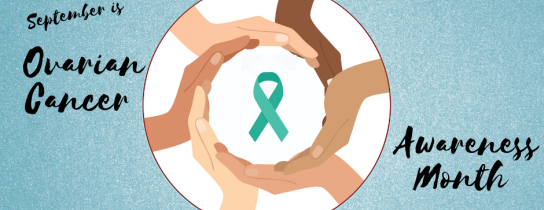
Ovarian Cancer: Signs, Symptoms, Risk Factors and Prevention
Ovarian Cancer: Signs, Symptoms, Risk Factors and Prevention
The first step in fighting cancer is knowing you’re risk. Did you know ovarian cancer is the 5th deadliest cancer for women? September is Ovarian Cancer Awareness Month; increase your awareness of this disease to learn if you or the women in your life are at risk for developing ovarian cancer and what steps can be taken to help to prevent it.
The American Cancer Society estimates that in 2018 alone 22,240 women will receive a new diagnosis of ovarian cancer and 14,070 will die from the disease.
What Are the Symptoms of Ovarian Cancer?
Signs of ovarian cancer may be present in the early stages of the disease, but are more commonly present if the cancer has spread. Some signs and symptoms related to the stomach include:
- Bloating
- Pain in the stomach or pelvis
- Stomach swelling with weight loss
- Upset stomach
- Trouble eating or feeling full quickly after you start eating
Other signs and symptoms:
- Irregular changes in menstrual cycle (heavier or irregular bleeding)
- Fatigue
- Frequent or urgent urination
- Constipation
- Pain during sex
The signs and symptoms of ovarian cancer are often common occurrences. If any of the above symptoms are a change from normal and persistent, it could be a sign of ovarian cancer. Tell your doctor if you’ve experienced any of the above more than twelve times in one month as recommended by the American Cancer Society.
What Are Risk Factors of Ovarian Cancer?
There are many factors that increase your risk of getting ovarian cancer. Some factors can be changed while others can’t. Risk factors include:
- Getting older
- Having children after age 35
- Never carrying a pregnancy to full term
- Family history of ovarian, breast, or colorectal cancer
- Family Cancer Syndromes – certain types of cancers can run in families. This may be due to shared exposures, behaviors, or an abnormal gene passed down that is not cancer, but can lead to it.
- Having had Breast Cancer
- Using Fertility Treatments
- Post menopause hormone therapy
- Consuming alcohol
- Smoking
Avoiding some of the risk factors that you’re able to control can help reduce your likelihood of getting ovarian cancer.
Additional Ways to Prevent Ovarian Cancer
Aside from lifestyle modifications to reduce certain risk factors, using oral contraceptives for 5 or more years can also reduce the risk of ovarian cancer for average risk women and BRCA mutation carriers. A hysterectomy and tubal ligation can both decrease the risk of developing ovarian cancer. These procedures should only be performed for medically necessary reasons and not just to reduce the risk of ovarian cancer.
Best Course of Action: Consult Your Doctor
It’s imperative that you schedule an annual well woman’s visit in addition to your yearly physical. Make sure your OB/GYN is aware of your family’s medical history, especially when it comes to female specific cancers. A well woman’s visit is the perfect time to discuss any concerns you may have with your OB/GYN pertaining to risk factors or ovarian cancer in general.
The first step in the fight against cancer is knowing if you’re at risk and what signs/symptoms you should be on the lookout for to tell your doctor.
Sources:
American Cancer Society
National Cancer Coalition

 Optum Radiology at Crystal Run Healthcare
Optum Radiology at Crystal Run Healthcare Request medical records online
Request medical records online